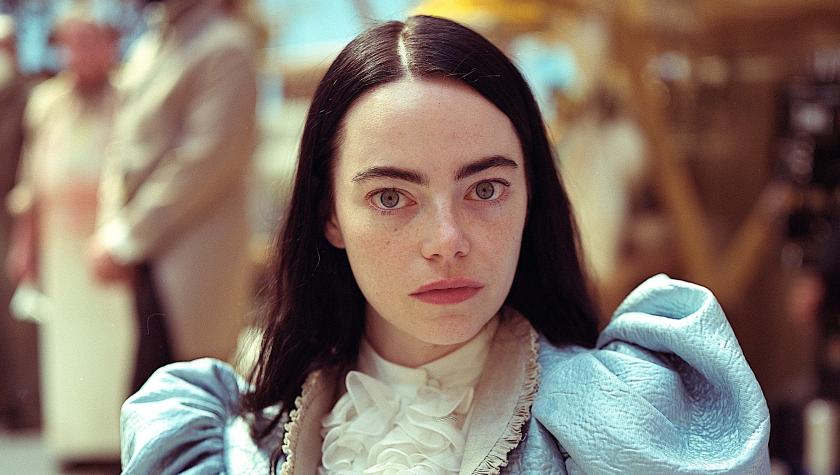Following their award-scooping collaboration on 2018’s The Favourite, Emma Stone and director Yorgos Lanthimos return with this mind-bending adaptation of Alasdair Gray’s eponymous novel. Also on board is screenwriter Tony McNamara, who wrote (with Deborah Davis) The Favourite’s screenplay. You might say lightning has struck twice, with Stone collecting the Best Female Actor award at the recent Golden Globes and the film winning for Best Musical or Comedy. More mantelpiece-adornments seem certain to follow.
But while it’s not a musical (though it has music in it), is it a comedy? It’s undoubtedly funny, but it’s also grotesque, horrific, provocative and surprisingly political. Any similarities to Frankenstein are undoubtedly deliberate, not least since Willem Dafoe’s character, Dr Godwin Baxter, is a Scottish surgeon whose face seems to have been assembled from a basket of human offcuts, stitched together by somebody with five thumbs on each hand using fishing twine.
 Baxter, the son of another eminent surgeon (“a man of unconventional mind”), rescued Bella (Stone) after she drowned herself by jumping off a bridge. Discovering that the baby she was carrying had survived, Dr Baxter ingeniously installed the living brain inside Bella’s skull. Obviously he’s a surgeon of supernatural capabilities but questionable taste, as illustrated by his domestic wildlife – goats and dogs with the head of a duck, a pig’s head on a chicken’s body. He has been supervising Bella’s progress from born-again infanthood towards maturity with a caring, proprietorial hand.
Baxter, the son of another eminent surgeon (“a man of unconventional mind”), rescued Bella (Stone) after she drowned herself by jumping off a bridge. Discovering that the baby she was carrying had survived, Dr Baxter ingeniously installed the living brain inside Bella’s skull. Obviously he’s a surgeon of supernatural capabilities but questionable taste, as illustrated by his domestic wildlife – goats and dogs with the head of a duck, a pig’s head on a chicken’s body. He has been supervising Bella’s progress from born-again infanthood towards maturity with a caring, proprietorial hand.
This fantastical premise throws down the gauntlet to Stone, who must depict Bella’s journey as she masters basic stuff like speech and movement, then develops a consciousness of her place in a world full of traps and threats, and which certainly doesn’t go out of its way to make life easy for women. Initially, Bella’s movements are clumsy and robotic, as if she’s walking on borrowed legs and hasn’t had her inner equilibrium adjusted. Her language, too, is primitive and barely functional, and she’s prone to bouts of childlike petulance and wanton destructiveness. But gradually she morphs into a functioning adult, with Stone enacting the stages of her gradual evolution with great technical expertise. If you begin to imagine you can catch an echo of My Fair Lady, you could conceivably be right.
The story’s other-worldliness gets a big leg up from the wonderfully strange and unsettling score by Jerskin Fendrix (not his real name), as well as the design and cinematography (take a bow, cinematographer Robbie Ryan). The Victorian milieu is evoked in silkily-textured monochrome, while fisheye lenses give the thing the feeling of a daguerreotype or a world viewed through old-fashioned box cameras. Later on, the production blossoms into full opulent colour as though imported from the golden age of cinema (think The Red Shoes), as Bella tours the world and visits lavishly-imagined versions of Lisbon or Paris or Alexandria. The steamship on which she travels looks more like a fairytale city than a boat.
 And meanwhile, an undercurrent of feminist self-empowerment ticks loudly beneath the narrative, since Bella is able to view the world afresh, unfettered by the patriarchal dictates of the era. A lightbulb moment is when Bella discovers masturbation, and very soon finds she can’t get enough of it. Dr Godwin (she calls him “God”) wants her to marry his mild-mannered medical student, Max (Ramy Youssef), but she impetuously runs off with sleazy lawyer, Duncan Wedderburn. He’s played with louche lasciviousness by Mark Ruffalo, but if he imagines Bella is going to become his submissive sexual plaything, he’s got another think coming.
And meanwhile, an undercurrent of feminist self-empowerment ticks loudly beneath the narrative, since Bella is able to view the world afresh, unfettered by the patriarchal dictates of the era. A lightbulb moment is when Bella discovers masturbation, and very soon finds she can’t get enough of it. Dr Godwin (she calls him “God”) wants her to marry his mild-mannered medical student, Max (Ramy Youssef), but she impetuously runs off with sleazy lawyer, Duncan Wedderburn. He’s played with louche lasciviousness by Mark Ruffalo, but if he imagines Bella is going to become his submissive sexual plaything, he’s got another think coming.
Bella’s later experiences in a Parisian brothel may strike some as … what’s that word?… problematic. The brothel-keeper, Madame Swiney, tries to sell the notion that an A-Z of sexual experiences can “make us people of substance”, but you may feel it’s merely 50 shades of sexual exploitation. Emma Stone has explained how she sees her journey – "the more agency Bella gets, the more she learns and grows, the more it drives these men insane.”
The solution is clear. Go and see it and make your own mind up.















Add comment